News
Competition and equine ethology : Andy Booth and Gwendolen Fer share them experiences
11 October 2022
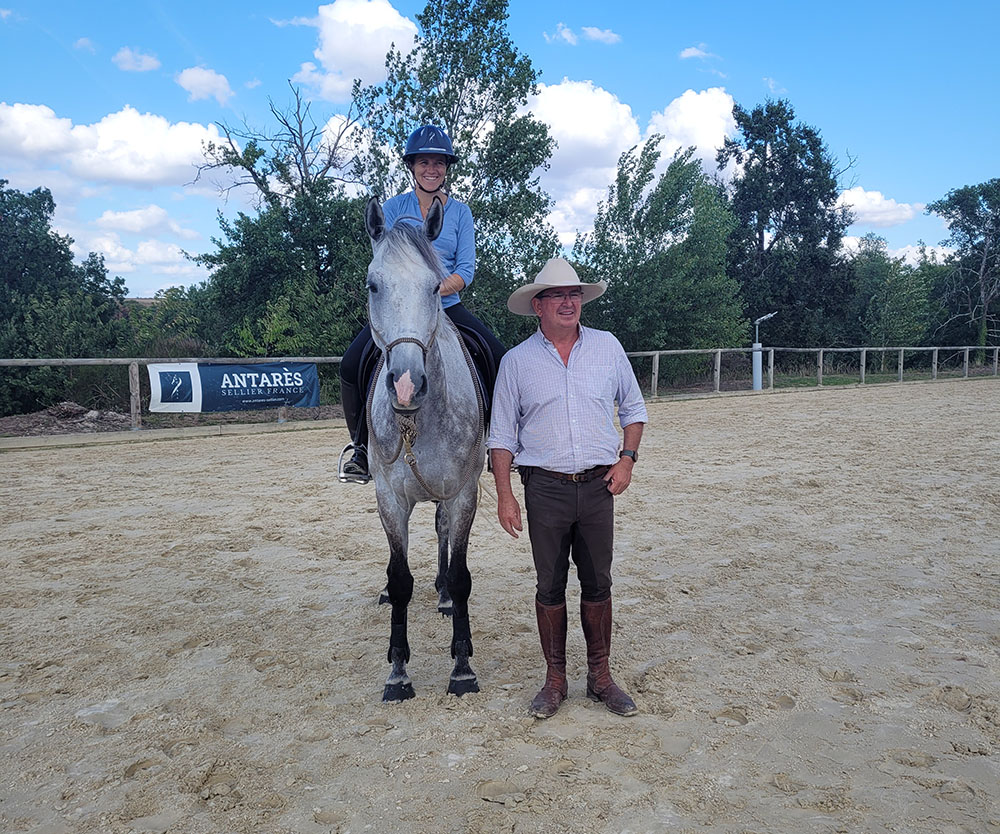
News
11 October 2022

Andy Booth and Gwendolen Fer may both be world-renowned horse riders and trainers but their paths haven’t crossed at competitions. They share the same passion for horses and have devoted their lives to them. Yet their respective trades, equine ethology and elite sport, are often separated. Read the joint interview with these 2 great Antarès riders.
Gwendolen Fer: I’ve been interested in equine ethology for a while. Anaïs (editor’s note: Gwen’s employee for 1 year) has state qualifications in ethology and she introduced me to it. You never have any spare time in my trade so my pregnancy gave me a chance to learn about it. Maxime (editor’s note: Gwendolen’s partner) knows Andy through the French endurance team and I asked him to call him so we could do a course. I really wanted to learn and broaden my horizons. Andy liked the idea and invited me to the stables.
Andy Booth: That’s right, I met Maxime on a course with the French endurance team. We realised how much our trades have in common. He works on mental preparation for athletes, which involves stress and the rider’s emotions. I do the same but for horses. So we discussed different mental and emotional issues and their physical effects. Then Max contacted me about a course.
First of all, I didn’t want to run a “normal” course because I know Gwen’s reputation as an elite athlete. I needed time to introduce and explain the subject to her before being in a situation with 8 students and as many horses to handle. I wanted a more “laid-back” working environment to address different subjects and work with the horses together, without involving the work a course requires. I don’t always have the time to chat if I have to train students. It’s hard to make the connection with “sport“. I’d have to focus on the “basics” and I’d have all the other clients talking to me. It’s hard to have a one-on-one. Gwen came up with the idea of having a real dialogue. I’ve always been fascinated by working with elites. There’s real credibility, which you don’t always get.
Gwendolen Fer: Ethology came to mind when I had issues with certain horses who had all the elite hallmarks but difficult personalities. I couldn’t teach them, despite my efforts. Or rather, I just ran out of solutions. By that I mean non-technical solutions. Let’s take health… I may have experience with so-called “difficult” horses but I told myself there must be another and better way to handle them. I didn’t know about equine ethology but it gave me really helpful solutions.
Obviously there’s the “sport” side with all its technical difficulties. I can’t take my foot off the gas if I want to be competitive. What I mean is that the two go together, unless it’s groundwork which I had no knowledge of. It wasn’t taught back when I was taking my Galops and state exams. So I just didn’t know anything about it. That said, I thought it could tie in and help me work with my elite horses.
Andy Booth: It’s called ethological riding but I think what we should really be talking about is equine training. Horse training isn’t just about technique. That’s one of the reasons I came to France. I find horse training fascinating and powerful. But we can be more than “just” trainers. We have to be “grooms” too to educate an animal. I always thought that if we could bring training and riding techniques together then we could have a powerful and unbeatable combination. Very good riders tend to be very good trainers but not necessarily very good grooms. And I’m being very diplomatic about that. There are trainers who think they’re real horsemen. But actually, there are very good horsemen with gaps in their knowledge. I myself would struggle to reproduce Gwen’s techniques. I can start two track work and change legs. That’s where I start to reach my limit. And I know my limits. Because I’m an expert in the “basics“.
Sometimes a trainer can misinterpret behaviour. For example, a rider will increase pressure if the horse doesn’t want to approach the river. That makes the horse even more reluctant to approach the river and the horse and rider end up in a vicious circle. It’s not a lack of technique; it’s a lack of understanding and knowledge of the animal. When you have a good understanding of the basics and the animal, it can only be a good thing. And that leads onto competition.
I’ve always seen equine ethology as a big book with 4 chapters:
1. understanding, 2. basics, 3. riding and 4. competition.
There may be gaps in the first chapters: understanding and basics. I think it’s very hard to address the 4th without the first two. And that’s where I come in. I can help with chapters 1 and 2; Gwen can help with chapters 3 and 4. I think the combination can only be a good thing for riding, competition, horses and riders. It’s important to do it. If ethological riding remains a separate subject from riding and competition then what’s the point? There has to be that connection. That understanding and the basics can be used in horse riding.
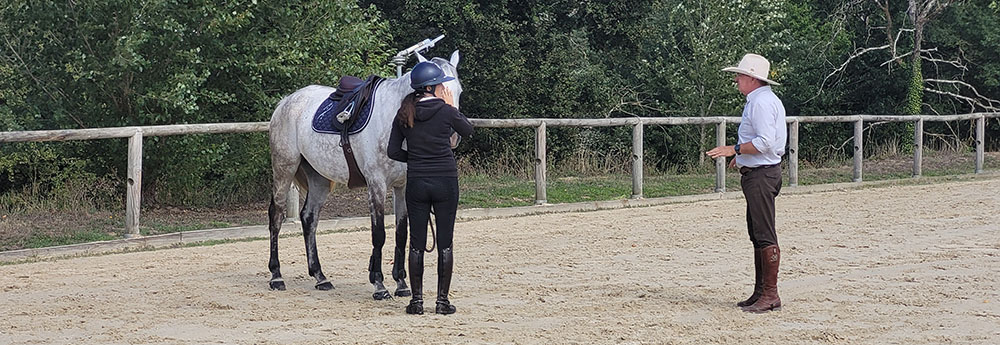
Andy Booth: First of all, you have to start with the basics. Handling stress in competition sometimes comes from missing a trick. That’s something that the rider should have spotted beforehand. We talked a lot with Maxime about stress in people, it’s an important topic. If we can’t control our own emotions then that makes it hard to control a horse’s emotions too. You have to have very solid foundations in place to do so. If you don’t then everything crumbles when it comes to building something else. So you have to have a very good base. If you manage it, you should have fewer issues with stress during competition. If you don’t have a very strong base then the horse can soon get into difficulty. Fail to prepare, prepare to fail.
Just take how I reviewed breaking in with the horses we’ve worked with today. Even though they’re elite horses. The basics are key.
Gwendolen Fer: I think different things can make horses feel under stress: a rider under stress, unpleasant situations for the horse that we fail to notice etc. And this is just my opinion, but it can be when things move too fast. When you put horses into difficult events too quickly, they can worry and become stressful. So it partly depends on how you handle young horses. If you’re patient with them and gradually move them into more advanced stages without rushing them then they feel comfortable. But if it doesn’t work out, it’s trickier. That’s where Andy comes in.
There are other situations which I’m unsure how to handle and I need solutions for. Like when a horse is alone on the track when they were in a stable with lots of horses just before. That kind of situation is where I need to learn more.
Andy Booth: We discuss the basics before going into competition but the rules mustn’t change during the competition either. Let me paint you a picture. Imagine the “rules at home are the same as in a restaurant.” I’ve seen horses get colic just because their hair is being braided. That’s when you know there’s an association issue. So you have to ensure that the start of the competition is like at home. It has to be as close as possible so that the horse doesn’t think being in competitions is horrible! So yes, you can up the pressure a little because you’re in competition but you have to avoid the association that competition = serious stress. Otherwise problems soon arise. At home everything’s fine but it’s awful in competition. The rules at competitions often differ from those at home. The horse shouldn’t make the distinction between home and competition. You just dress differently, that’s all.
When I do demonstrations, as small as they are, there’s always a microphone, music and external features that give the event scale. It’s an opportunity to make amends. The first show is never the best because I have to pick up on certain things that I can’t let drop. And that can take time. It would be far quicker if I let things slide. You mustn’t confuse correction with punishment. If something happens that I didn’t want to then I have to correct it. If it’s fine at home but not in the public arena then that won’t work.
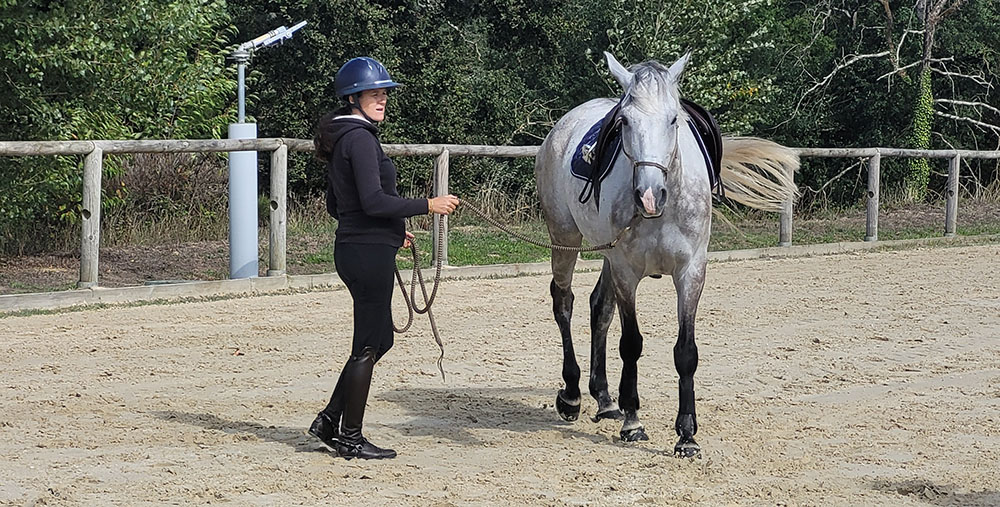
Andy Booth: The horse mustn’t lose sight of its environment or rider. I like to say “the horse thinks its handling its Australian” (editor’s note: Andy Booth is Australian). Especially during rest. I squeeze my leg, my horse reacts well, I stop squeezing my leg. I use my hand, my horse reacts well, I stop using my hand. Every time I apply pressure, the horse knows how to make it stop. I let them win but I don’t use my aids to force them. Not using my aids is my way to get the reaction and train them. I let the horse manage the environment. If they think that there’s a solution to every problem, they shouldn’t be stressed or feel like it’s a bad experience.
Now then, do they think they’re having the time of their lives? It’s us who choose to go into competitions, not the horse! But the sense that they are still in control of their environment is the best possible outcome. I think that if demonstrations outside my stables go well then there may be an appealing association. It’s up to us to explain to the horse that it’s fun. Most of my horses think I’m more fun in demonstrations than at home. So they behave properly.
Gwendolen Fer: I have competition horses. For example, Romantic is meek at home but as soon as he gets on the field his eyes glint and he wants to give all he’s got to win. On the other hand, there are introverted horses that feel “small” when they start competing. That’s why I think you have to be able to soothe them and reproduce a similar layout to what they have at home. Even though it’s not always possible.
For example, my horses go to the meadow a lot and they’re in stalls when the’re competing. So they need to get out more. In the end they get more attention because there are fewer horses to handle. We’re with them more and can massage and treat them. So I think they enjoy it too. Elite horses, the ones I’ve ridden and taken cross-country anyway, may feel a little stressed but they still want to go. If they didn’t really enjoy it, after a certain point you wouldn’t be able to force them any more. They have to be very brave and trust their rider to get past it. So I think elite horses enjoy it and we make them feel comfortable.
Andy Booth: That’s an important point. We’re even more present at these times than we are at home. Some of my horses probably think I want them to do more exciting things when I’m competing than when we’re at home. It’s an appealing association. It’s harder with more sensitive horses.
Andy Booth: It isn’t really to do with technique in my opinion. One of the reasons I wanted to spend time with Gwen during the course is because ethological riding can’t be separated from riding. And you can’t do ethological riding twice a week. We have a certain understanding of the animal that we put into our work. That’s when it becomes worthwhile.
So there’s no exercise. The main thing is to have an animal that isn’t afraid and to have control of its legs. The environment cannot control the animal if I have control of its 4 limbs to go forwards/backwards/focus on the hips/shoulders, on the ground and mounting. But if I don’t have good foundations for control then the environment, especially in competition, takes over and then… The screen, spectators and everything else gain greater significance. The risk is bad associations. The horse can be frightened because I’m not focused.
So I have to have confidence, control (of the 4 legs) and concentration. If I have the first 2 then I tend to have the 3rd too. But if I don’t have confidence and control then the environment takes control and then we’re in trouble!
Gwendolen Fer: I think it’s about diversifying work. If a horse does dressage every day and has to do the same thing with no breaks then it puts them off after a while. My horses are outside a lot, I think that’s important. I also do a lot of work in the fields. Just take Romantic who’s not interested in the riding arena. I often work on dressage in the fields. I work with the undulation too.
It lifts the horses’ spirits as well. I don’t think it’s something we should lose sight of. You have to diversify the work and locations for them. I think that’s how they come to enjoy it. That way we improve communication with them and gain trust.
Andy Booth: That’s why eventing has a huge advantage over others because it’s diverse. As I mentioned to Gwen, a lot of event riders are interested in equine ethology when they’re the ones who need it least. There are lots of varieties so there’s a sense of balance. Too much of the same thing isn’t good for horses. Too much variety isn’t great either.
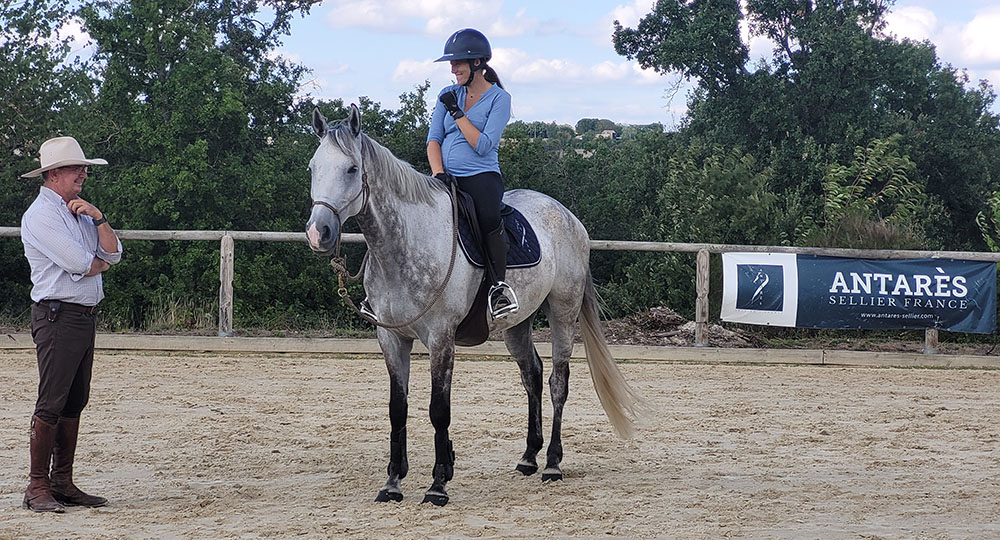
Gwedolen Fer: You need time to digest. After you reflect and analyse. Look at the tracks, try to understand the mistakes, bring in external consultants to point out things we may not have spotted (I mean the coach because they are essential no matter your ability). You need to use all that to bounce back, improve and not make the same mistakes again. I think that’s what sets a good rider apart from an elite one.
It’s bouncing back after reflecting and analysing the failure. I think that if you want to stay on top of your game, you can’t spend days feeling sorry for yourself. It doesn’t work. When I say digest, I mean for one night. Then the next morning you go back to work and focus on your next performance. That’s what sets the good apart from the great. Aside from the technical aspect and work, you have to accept you’re going to have bad sessions and bad days. So accept it and move on.
Andy Booth: It’s a bit of a cliché but the kind of quotes you see on Facebook are true: “I never lose. I either win or learn.” So you say to yourself: “OK, what have I learnt from this failure?” I can be fairly stressed when I’m doing a demonstration. I’m no magician, I don’t know if everything’s going to go to plan. But I know my job. I’m not in my comfort zone; I’m in my skill zone. It can still be stressful even though I like being out of my comfort zone. But sometimes it doesn’t go so well. Then I wonder how I can learn from it. You have to be able to question what you do and move on. You must never linger over it. How can you do better and move on? Don’t dwell on the negatives. OK, it happens, let’s get on with it!
Another thing is to explore the issue rather than get annoyed about it. When I started out and was working with difficult horses, I’d get very frustrated and that would stress out the horse. The 2 things together don’t work. So I said to myself: “Right, instead of getting annoyed, I’m going to explore it and see what I’m going to do about it.” From that moment on, it became far easier. Easier for me to deal with anyway.
Andy Booth: In our case, Gwen didn’t call me because she had a problem. There wasn’t the sense of coming in like a mechanic and finding a solution. Unfortunately that is often the case. And the problem tends to be because of a lack of training. I hope that soon I’ll be called in to help riders train their horses properly so there are no problems to solve. Spotting the problem can be a bit dangerous for me because I sometimes have to mount horses that haven’t had enough training. Another thing is avoiding the issue. There’s no point spending just one session training the horse. Old habits die hard. What we did with Gwen was a real process. There was a hunger to learn and do in-depth work. That’s a rare thing.
Gwen plays devil’s advocate and says that elite riders often don’t have enough time because of their competition schedules. The little time spent at the stables is devoted to horses and the days are often fairly long. She highlights that her pregnancy gave her the chance to soak up the experience and that she would like to have a team trained in ethology.
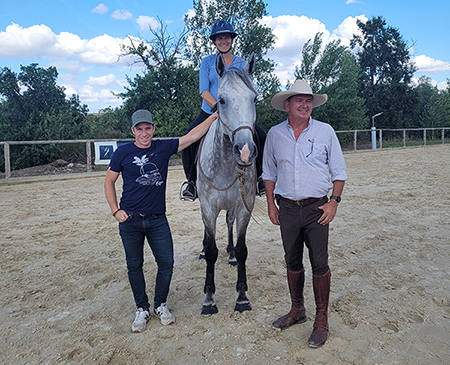
We would like to thank Andy and Gwen for taking time out to answer our questions. This interview has been a chance to share very complimentary opinions which have much in common. All the very best to Gwen and Maxime as they start a new chapter in their lives together.